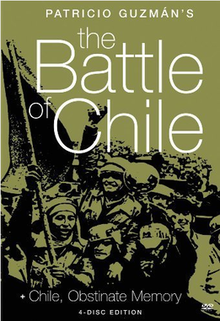The Battle of Chile
| The Battle of Chile | |
|---|---|
 |
|
| Directed by | Patricio Guzman |
|
Release date
|
1975, 1976, 1979 |
| Country | Chile |
The Battle of Chile is a documentary film directed by the Chilean Patricio Guzman, in three parts: The Insurrection of the Bourgeoisie (1975), The Coup d'état (1976), Popular Power (1979). It is a chronicle of the political tension in Chile in 1973 and of the violent counter revolution against the democratically elected government of Salvador Allende. It won the Grand Prix in 1975 and 1976 at the Grenoble International Film Festival. In 1996, Chile, Obstinate Memory was released and followed Guzmán back to Chile as he screened the 3-part documentary to Chileans who had never seen it before.
The film opens in March 1973 with reporters asking people how they intend to vote in the coming congressional election. The election is taking place after Allende has been in office for over two years and has been trying to reorganize society along democratic socialist lines. His "Popular Unity" coalition was put into office with only a third of the popular vote. His efforts to nationalize certain industries have met with internal and foreign opposition, and Chile is suffering economic deprivations.
In the election Allende makes gains to 43.4 percent of the votes, though the opposition bloc is strong too, up to 56 percent. The film has street interviews, speeches, the violent confrontations, the mobs and meetings, the parades with workers chanting. Part One finishes with newsreel footage from an Argentine cameraman Leonardo Henrichsen who was photographing street skirmishes. A soldier takes aim and kills the cameraman, and the image spins skyward.
Part Two - "The Coup d'état" begins with the right wing violence of the winter of 1973 (June is winter in the southern hemisphere) against the government. Army troops seize control of downtown Santiago - but the attempted coup is snuffed out in a few hours. "The film leaps from one group to another ... It shows the different elements in the explosive situation with so much clarity that it's a Marxist tract in which the contradictions of capitalism have sprung to life. We actually see the country cracking open. Step by step, the legal government is overthrown."
Everybody in Chile seems to know the coup d'état is coming and talk about it openly - yet the people who have most to lose can't get together enough to do anything. Allende's naval aide-de-camp Arturo Araya is killed, and the camera moves around the funeral attendees - General Augusto Pinochet among them. In July, the truck owners, funded by the CIA, begin their long strike, which paralyzes the distribution of food, gasoline, and fuel, and there is a call for Allende to resign. Instead Allende holds a rally - around 800,000 people arrive, but they have no weapons. On September 11, the Navy institutes the coup d'état, and the Air Force bombs the state radio station. The palace is bombarded from the air. And then the chiefs of the junta on television are seen announcing they'll return the country to order after three years of "Marxist cancer".
...
Wikipedia
